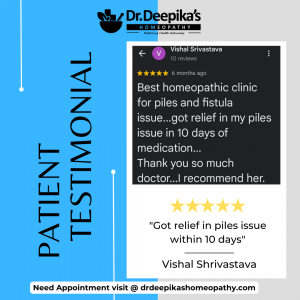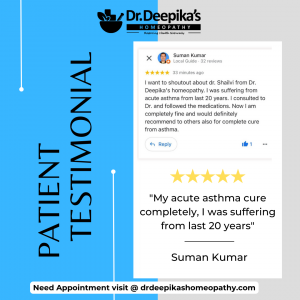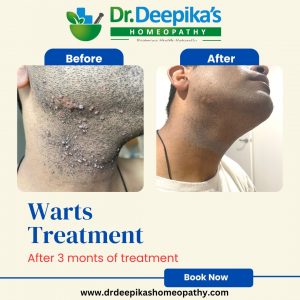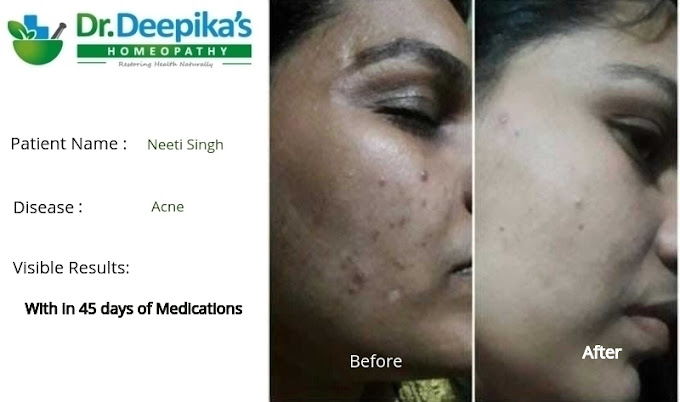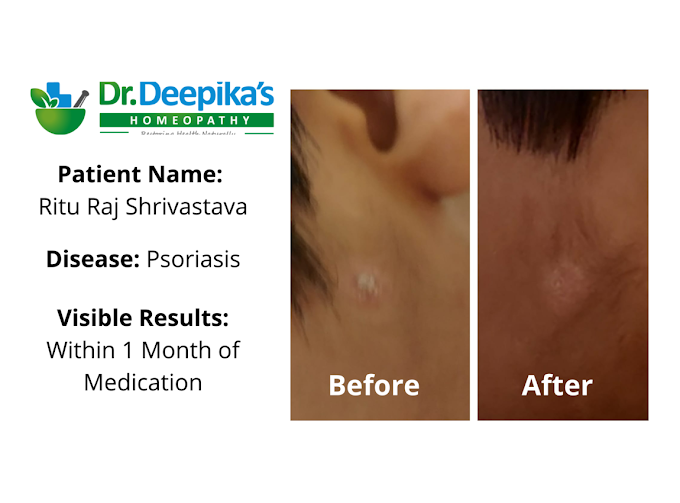Acne Treatment at Dr. Deepika's Homeopathy: A Holistic Approach to Clear Skin
Acne Treatment Overview:
Acne is a common skin condition that affects millions of people worldwide, causing distress and discomfort. It occurs when hair follicles become clogged with oil and dead skin cells, leading to the formation of pimples, blackheads, whiteheads, and cysts. While acne is most prevalent during adolescence, it can persist into adulthood and even arise later in life.
For those seeking an alternative to conventional treatments, homeopathic treatment for acne offers a promising solution. Dr. Deepika’s Homeopathy provides a holistic and effective approach to acne treatment, addressing the root causes and providing long-lasting relief. Homeopathic remedies are tailored to each individual’s unique skin condition, ensuring a personalized treatment plan that promotes healing from within. This approach not only helps clear existing acne but also works to prevent future breakouts, offering a gentle and natural pathway to healthier skin.
Facts About Acne:
Acne is not merely a cosmetic concern; it can also have significant psychological and emotional impacts on those affected. It can lead to low self-esteem, social withdrawal, and even depression in severe cases. While factors like hormonal changes, genetics, and diet can contribute to acne, other triggers, including stress, certain medications, and environmental factors, can exacerbate the condition.
Conclusion:
Dr. Deepika’s Homeopathy provides a reliable and unique approach to acne treatment by employing the principles of homeopathy to address the root causes of the condition. With a range of carefully selected homeopathic medicines, patients can experience effective and long-lasting relief from acne. Emphasizing a holistic approach to skincare, Dr. Deepika’s Homeopathy strives to restore clear and healthy skin, promoting overall well-being and confidence in her patients.
Disclaimer:
The information provided here is for educational purposes only and should not be considered medical advice. Treatment for acne should be sought under the guidance and supervision of a qualified dermatologist or healthcare professional. Individual responses to acne treatment may vary, and it is important to consult with a healthcare provider for proper diagnosis, evaluation, and personalized treatment options tailored to your specific skin type, acne severity, and medical history.
Types of Acne:
Acne can manifest in various forms, each with its own characteristics and severity. Here are some common types of acne:
Whiteheads (Closed Comedones): Small, flesh-colored bumps that occur when pores become clogged with oil, dead skin cells, and bacteria. The pore remains closed at the surface, causing the bump to appear white.
Blackheads (Open Comedones): Similar to whiteheads, blackheads are small bumps that form when pores become clogged with oil and dead skin cells. However, in blackheads, the pore remains open at the surface, causing the debris inside to oxidize and turn black.
Papules: Small, red bumps that are tender to the touch. Papules occur when the walls surrounding the pores become inflamed due to excess oil and bacteria buildup.
Pustules: Pustules are pimples with a white or yellow center filled with pus. They are typically inflamed, red, and tender, and may be surrounded by redness.
Nodules: Large, solid, painful lumps beneath the surface of the skin. Nodules develop when clogged pores deeper in the skin become further inflamed, leading to a larger and more severe lesion.
Cysts: Cysts are deep, painful, pus-filled lumps beneath the skin’s surface. They are larger than nodules and can cause significant scarring if not properly treated.
Acne Conglobata: A severe form of acne characterized by interconnected nodules and cysts. It often affects the back, chest, and buttocks and can lead to extensive scarring.
Acne Mechanica: Acne caused by friction, pressure, or occlusion of the skin, often due to wearing tight clothing or using equipment that rubs against the skin. It is common in athletes and individuals who wear helmets or tight straps for prolonged periods.
Acne Fulminans: A rare and severe form of acne that is accompanied by systemic symptoms such as fever, joint pain, and inflammation. It often occurs suddenly and can lead to significant scarring if not promptly treated.
Understanding the type of acne you’re dealing with is crucial for determining the most effective treatment approach. Homeopathic treatment for acne, such as that offered by Dr. Deepika’s Homeopathy, addresses the underlying causes of acne and provides personalized remedies to promote healing and prevent future breakouts.
Symptoms of Acne:
Acne is a common skin condition with a variety of symptoms that can affect individuals to different extents. Here are the typical symptoms of acne:
Pimples: Red, inflamed spots that often have a white or yellow center filled with pus. They are also known as pustules.
Blackheads: Small, dark-colored spots on the skin caused by clogged hair follicles that remain open at the surface.
Whiteheads: Small, white or flesh-colored bumps caused by clogged hair follicles that are closed at the surface.
Cysts: Large, painful, pus-filled lumps beneath the surface of the skin. These can lead to scarring if not properly treated.
Nodules: Hard, painful lumps beneath the surface of the skin that are more severe than typical pimples and can also result in scarring.
Papules: Small, red, raised bumps caused by inflamed or infected hair follicles.
Oily Skin: Increased oil production can contribute to the development of acne and is a common symptom in many individuals.
Scarring: Severe acne, particularly cystic acne, can lead to permanent scars and dark spots even after the pimples have healed.
Redness and Swelling: Affected areas may appear red and swollen due to inflammation.
Homeopathic treatment for acne, such as that offered by Dr. Deepika’s Homeopathy, can effectively address these symptoms. By focusing on the root causes and utilizing personalized remedies, homeopathy provides a holistic approach to achieve clearer, healthier skin and reduce the likelihood of future breakouts.
Diagnosis of Acne:
Diagnosing acne typically involves a combination of visual examination, medical history review, and sometimes additional tests to assess the severity and potential underlying causes. Here’s how acne is diagnosed:
Visual Examination: A healthcare provider will visually inspect the skin to identify the characteristic symptoms of acne, including blackheads, whiteheads, pimples, cysts, and nodules. They may also assess the distribution and severity of lesions.
Medical History: The healthcare provider will ask about the patient’s medical history, including any past or current skin conditions, medications, skincare routines, diet, and lifestyle factors that may contribute to acne development.
Classification: Acne may be classified based on its severity and type, such as mild, moderate, or severe acne, as well as specific types like comedonal acne, inflammatory acne, or nodulocystic acne.
Assessment of Lesions: The healthcare provider may examine individual lesions to determine their characteristics, such as size, color, tenderness, and whether they are open or closed comedones, papules, pustules, nodules, or cysts.
Additional Tests: In some cases, additional tests may be recommended to assess hormonal imbalances, underlying medical conditions, or potential triggers contributing to acne. These tests may include hormone level tests, skin cultures, allergy tests, or imaging studies.
Differential Diagnosis: The healthcare provider may also consider other skin conditions that mimic acne, such as rosacea, folliculitis, perioral dermatitis, or fungal infections, to ensure an accurate diagnosis.
Severity Assessment: Acne severity may be assessed using standardized scales, such as the Global Acne Grading System or the Leeds Acne Grading Scale, which take into account the number and types of lesions present, as well as their distribution and inflammatory status.
Once a diagnosis is made, the healthcare provider can recommend an appropriate treatment plan tailored to the individual’s specific type and severity of acne. This may include topical or oral medications, lifestyle modifications, skincare routines, and in some cases, complementary therapies such as homeopathic treatment for acne provided by specialists like Dr. Deepika’s Homeopathy. Regular follow-up appointments may be scheduled to monitor progress and adjust treatment as needed.
Homeopathic Treatment for Acne:
Dr. Deepika’s Homeopathy offers a unique and holistic approach to acne treatment. Homeopathy treats acne by addressing the root cause of the condition rather than just alleviating the symptoms. The treatment aims to strengthen the body’s natural healing mechanisms and enhance overall well-being.
Homeopathic Medicines for Acne:
Hepar Sulph: This remedy is effective for painful, pus-filled lesions that are sensitive to touch. It helps promote drainage and healing.
Silicea: Useful for treating deep-seated acne with a tendency to form abscesses. It aids in expelling the pus and promoting healthy skin.
Kali Bromatum: Ideal for acne with pustules, especially on the face, chest, and shoulders. It is beneficial for individuals with oily skin and deep-rooted acne.
Berberis Aquifolium: This remedy is helpful for acne with a blotchy, yellow complexion. It addresses acne resulting from digestive issues.
Sulphur: Useful for individuals with itchy and inflamed acne, especially worsened by heat.
It’s important to note that homeopathic treatments are individualized, and the selection of medicine is based on the specific symptoms and constitution of the patient. Dr. Deepika, with her expertise in homeopathy, carefully prescribes the most suitable remedy for each patient.



EXCELLENTTrustindex verifies that the original source of the review is Google. GoodPosted onTrustindex verifies that the original source of the review is Google. Docters are very kind and help full Providing the best results and cure Really happy to share thi reviewPosted onTrustindex verifies that the original source of the review is Google. I approached her for my sinus treatment which I am having for years and she cured 90% of it in just 3 sittings and her approach is something I haven't seen with any of the doctor I met before, she is really good.Thank you so much doctorPosted onTrustindex verifies that the original source of the review is Google. She is best homeopathic doctor at sector 62, I was suffering from chickenpox , smallpox issue.. I got relieved from her medicine in 7 days.. Thanks doctorPosted onTrustindex verifies that the original source of the review is Google. What a miracle!! I contact Dr. Deepika's homeopathy for the treatment of external hemorrhoids. Result was unbelievable, withing 7 days it cured. Thanks for wonderful service.Posted onTrustindex verifies that the original source of the review is Google. Dr deepika Best doctor for kidney stone in noida.. You will get garateed relief within 30 to 45 days of medicine.. I got relief within 1 -2 doses only.








